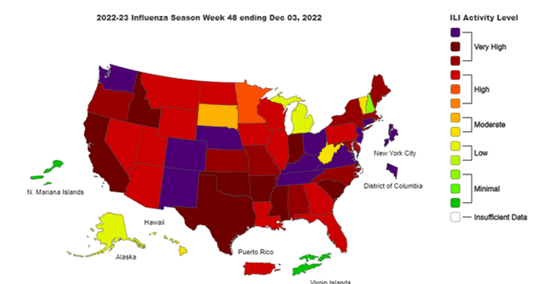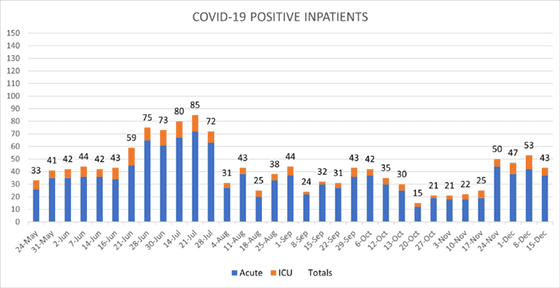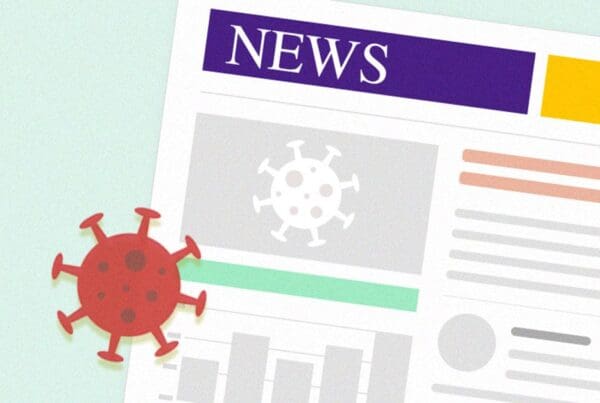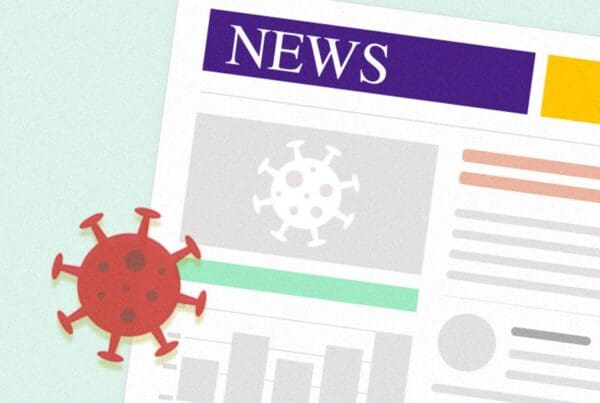Quick Read:
- We should prepare for COVID-19 activity to increase over the holidays and for influenza to continue to surge locally and across the country.
- Employees should continue wearing the highest level of respiratory protection available to them and stay home when sick to protect themselves, patients and staff.
- For holiday gatherings, consider the risk level and take commonsense masking precautions to protect people who are more vulnerable to respiratory infections.
- It’s not too late to get the influenza vaccine or the COVID-19 bivalent booster.
It was about this time last year that we started seeing early signs of what would become the largest surge of the pandemic to date. Driven by the highly transmissible Omicron variant, COVID-19 infections took off, overwhelming health systems across the country, including ours at UW Medicine.
One year later, we enter the holidays facing a different but no less concerning situation. COVID-19 cases are rising again. Although it’s unlikely we’ll see anything close to last year’s Omicron wave — partly because the most dominant forms of the virus circulating right now, BQ.1 and BQ.1.1, are Omicron subvariants — we should be prepared for another surge.
Complicating matters is the early arrival of influenza and respiratory syncytial virus (RSV). While RSV spiked last month and has been coming down locally, influenza has continued to spread. In fact, as of last week, Washington has one of the highest rates of influenza-like illness in the country. According to the latest data from the Washington State Department of Health, there have already been 26 lab-confirmed influenza deaths, including three children, this season.

The 2022-23 flu season has arrived early and continues to cause problems nationwide. Washington is among the hardest hit states right now. (Source: CDC)
All of this comes at a time when hospitals are dealing with historic staffing shortages and capacity constraints. So, where does this leave us with two weeks left in 2022?
If there’s a silver lining, it’s that we’ve been through surges before. We know what they look like, and we’re more prepared to manage them based on experience. Part of that management includes all of us taking an active role in our personal protection at work and in the community. As UW Medicine employees, we are required to be up to date on our COVID-19 and influenza vaccinations. We should also be wearing the highest level of respiratory protection available and staying home when sick. These small actions can have a big impact, especially when patient care spaces need to be shared due to capacity challenges.
For those who are traveling for the holidays or planning to be around large groups of people, I’d encourage similar precautions, including masking and COVID-19 home testing. You can also hear how I am personally preparing for the holidays on our news video, Health guide to gathering, traveling during the 2022 holiday season.
We heard good news today that free COVID tests are again available through the federal government. I’d also suggest using some of the ventilation and filtration strategies for improving the indoor air quality of your home that are described in this helpful post from Public Health – Seattle & King County.
As for gatherings, each comes with its own level of risk. It seems everybody I’ve talked to in the past month has a child, or has known a child, who has been sick recently. Often, it’s the kids who pass respiratory illnesses to the adults in a family. For some of those adults, such as those who are older or with compromised immune systems, getting sick means getting hospitalized. So, knowing who will be at the holiday gatherings you attend is important. A gathering of healthy young people has a much lower risk profile, for example, than one with grandparents and infants, who may be more susceptible to respiratory infections.
Now is also a great time to remind your friends and family that it’s not too late to get the influenza vaccine or the COVID-19 bivalent booster. Plenty of appointments are available through UW Medicine and it’s safe to get both shots at the same time. Vaccines truly make a difference. A report this week estimated that COVID-19 vaccination programs prevented more than 3 million deaths in the U.S. over the past two years. Our teams at UW Medicine have certainly contributed to that life-saving work, having administered nearly 681,000 doses of the COVID-19 vaccine to our community during that time. Overall, these are gratifying numbers that serve as a good reminder of the important role vaccines play in protecting public health.
Clinician Update: Therapeutics for Respiratory Viruses
Here is an update from our therapeutics team on the treatment options currently available for infected patients with a high-risk of suffering a severe COVID-19 or influenza outcome.
COVID-19
- Our guidance for oral antivirals remains the same. For outpatients who are recipients of solid organ transplant and are not able to receive paxlovid, we are offering intravenous remdesivir. Intravenous bebtelovimab is no longer recommended.
- We are no longer recommending or offering Evusheld for prevention in our immunocompromised patients because it is no longer effective against most circulating variants.
Influenza
- Local cases are surging, as mentioned above. Please refer to OCCAM for guidance on the use of antivirals for influenza.
- There have been intermittent shortages of Oseltamivir this season. UW Medicine has a stable supply at this time, but please be aware that community pharmacies may be experiencing shortages.
UW Medicine COVID-19 Activity Summary

Local/National/Global Epidemiology
King County: Public Health – Seattle & King County is reporting 533,394 total cases and 3,327 deaths as of Tuesday, Dec. 13. The number of new positive tests over the past seven days is currently at 77.8 per 100,000 people.
Washington: The Department of Health reports 1,872,837 cases and 14,898 deaths as of Dec. 13.
United States: The Centers for Disease Control and Prevention reports 458,986 new cases weekly, 99,241,649 total cases and 1,080,472 deaths as of Dec. 14.
Global: The WHO COVID-19 Dashboard reports 646,740,524 confirmed cases and 6,637,512 deaths as of Dec. 15.
The end of the year always brings with it an opportunity for reflection. As I think back on all that has happened and everything we’ve been through together, I’m reminded of how grateful I am to be surrounded by supportive colleagues doing important work in service of this amazing community. I hope you feel the same.
Here’s wishing you all a happy, healthy and peaceful holiday season. We’ll see you next year!
Sincerely,
John Lynch, MD, MPH
Medical Director, Infection Prevention & Control
Associate Medical Director, Harborview Medical Center
Division of Allergy & Infectious Diseases, UW School of Medicine

